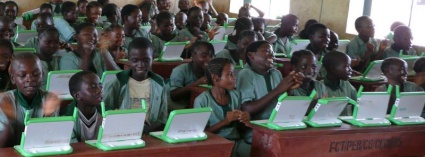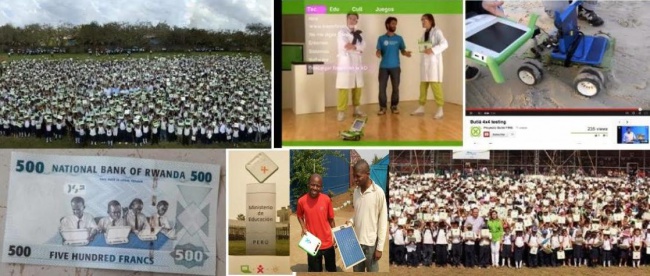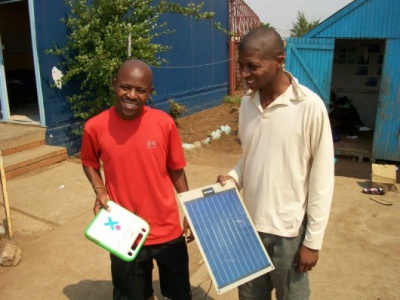OLPC South Africa
| Country Information | |
| ISO Country Code | DZ |
| Wikipedia Article | Africa Wikipedia Link |
| Government Support | Invalid Support Param |
| Deployment | Invalid Deployment Param |
| Languages | |
| Keyboard Layout | French Layout |
| Written | French (fr) |
| Spoken | French (fr) |
| Secondary Written | English (en) |
| Secondary Spoken | lingala, swahili, kikongo et tshiluba |
Welcome
... and thanks for visiting the pages for OLPC related matters in South Africa. OLPC is the One Laptop Per Child Universal Primary Education project and largest educational project undertaken by Humanity ever. Supported by United Nations, OLPC is an "Open Commmunity" project, similar to the Wikipedia and Open Source Community projects, like Linux, OpenOffice, etc. and it is working along Agenda 21 and Millennium Development Goal nr.2: Bringing Universal Primary Education. To edit text on this page or add pages, log in and and "edit page / save page" button will appear.
- 2' video - OLPC Intro part 1
- 2' video - OLPC Intro part 2
The aim of this educational project is on one hand to bring Universal Primary Education by 2015 as - anno year 2000 initiated - United Nations Millennium Development Goal nr.2. On the other hand, OLPC's mission is to manage the open hard and software project, to bring forward the best possible laptop combination for education: the XO-XServer combination. For this and above approach, - and also a lot of lobbying by the right persons on the right places and time - the United Nations is a Partner in this Open Community project! It is the largest educational project undertaken by Humanity ever, and deemed by many as one of the most inspiring projects out there. Things are moving very fast indeed: 2008 saw the first 3 countries with full coverage, i.e. with all kids age 5 to 12 equipped with these smallest schools in a box-laptops and Australia is now following at fast pace too, over 86.000 eBooks available, all education disciplines covered, etc. etc..
Beaucoup d'inhabitants cherchent fortune ailleurs. Therefore there is a very very large diaspora. We hope that this diaspora will work their way to these pages, set-up, link-up their projects with OLPC, coordinate projects and that they can inspire many in their host countries to come along. It is so difficult in these host countries to develop additional value and hence make money. In many regions in the home country however it is so easy as everything is to be developed.
Also the societies from the host countries will benefit from the South Africa diaspora who has one leg in the host country and another still in their countries of origin. Maybe it will start by developing leadership for OLPC, but soon it will be accompanied by exporting technologies, know-how and experience from the host countries along Agenda 21, the MDG's and together you will be able to accelerate bringing the level of quality of life in South Africa to a level that will inspire others, existing generations and generations to come.
Please feel free to create links, (sub-)categories or list or start collaborating, teaming up and expanding our and your projects, existing and new ones in one of these (sub-)categories.
South Africa is one of the 18 partner countries of Belgian governmental cooperation were selected on the basis of their degree of poverty, aspects of good governance and Belgium’s potential for providing meaningful support. The precise criteria for selecting countries are set out in the law on international cooperation, which limits the maximum number of recipients to 18 partner countries. More: http://diplomatie.belgium.be/en/policy/development_cooperation/countries/partner_countries/
South Africa is not a Least Developed Country as per http://en.wikipedia.org/wiki/Least_developed_country
Suggested Links and categories
- South Africa
- OLPC South Africa
- South Africa Looking Backward to what has been done
- Brainstorming how to get the South Africa Gvt interested in OLPC
- What every government should ask itself when considering an ebook deployment
- Stages and Budget
- South Africa Stages and Budget
- South Africa Budget for Phase II, Data Retrieval Phase
- FAQ South Africa
- Who's Who OLPC-South Africa
- South Africa Meetings
- OLPC Africa
- OLPC Afrique
- Deployment Guide
| 2007 status: red | ||||
| red | ||||
Old Content
Old content archived at OLPC South Africa/Archive
A case study has been written on the grassroots programs in South Africa
South Africa, 2008-2012 (pdf)
OLPC in South Africa
Kliptown Youth Program (KYP)
- Location: Kliptown, Soweto
- KYP director: Thulani Madondo
- Project organizers: Hannah and Julia Weber; Boston, MA
- Website: Kliptown Youth Program
March 2008: This effort was formally launched with the delivery of 100 XO laptops on March 13 and 14, 2008. Martin Mulcahy, special advisor to Minister of Education Nalendi Pandor, provided electronic books for the laptops through Ithuba books in early 2008. Senior government officials Jennifer Rault-Smith and Palesa Tyobeka implemented the process for delivery of the materials. Whitney Hunter-Thomson, a student at Williams College, worked in South Africa in early 2008 to prepare for the March launch. Matt Keller, OLPC Director for EMEA, identified Kwesi Smith from the Kofi Annan Center for Excellence in Accra, Ghana as one who could help with training on the laptops. Smith attended the launch and helped to implement the network and set up the laptops.
August 2008: A Microsoft advertising team led by Pamela Kaplan filmed the KYP youth with their laptops in Kliptown.
November 2008: 150 XOs were delivered to KYP. Neo Masilo, an IT consultant who ran an Internet café in Walter Sisulu Square, joined KYP full-time to train teachers and students on the laptops. Masilo trained three South Africans on the technicalities and logistics of setting up laptops in schools. They have joined KYP and have been introduced to David Cavallo, who is managing the deployment of XOs in Rwanda.
eSibonisweni primary school / Saint Mark’s school
Jennifer Getz of Saint Mark’s school in conjunction with Norm Lyons and Stacey Kertsman have been working to partner U.S. schools with poor schools in South Africa as part of their effort to deliver XOs to South African children. This effort was initiated with the partnership of Saint Mark’s in San Francisco Bay Area with rural primary school eSibonisweni in KZN. In October 2008, 100 laptops were delivered to eSibonisweni via Thulani Madondo, who heads the Kliptown Youth Programme.
Getz, Kertsman and Lyons have formed eduWeavers [1] and have been working with Dylan Wray of Shikaya and Boston-based organization Facing History and Ourselves to explore the possibility of mentoring teachers in the Western Cape on laptop use. eduWeavers is working with Dave Hall to mentor/train teachers at eSibonisweni on the laptops. In January 2009, students began to use the laptops at eSibonisweni. Wray has also drawn up a proposal for joint-curriculum ventures between township high schools and U.S. high schools, many of which already employ Facing History to enrich their programs. eduWeavers have presented their partnership plan to a number of schools in the United States and are in the process of developing a founding school team of partnerships to replicate the success of the Saint Mark's/eSibonisweni partnership.
eduWeavers has met with government officials in South Africa who oversee education for the country. Most recently Getz met with Gail Weldon, Senior Curriculum Planner (History) and Phumla Satyo, Director FET Curriculum, both at the Western Cape Education Department. She has also been in touch with the head of curriculum development in Cape Province.
eduWeavers is also working with an NGO in South Africa that creates electronic math-related curriculum in multiple languages.
Haenertsburg area schools / Indiana University
Location: Limpopo province South African contact: Thulani Madondo, Kliptown Youth Programme Project organizers: Carolyn Commons, Nolan Meyer, Shay Ley, Megan Tasher, Alexa Schutz, and Kyle Thompson, One Here...One There, Thusanang Trust
Indiana University’s chapter of One Here…One There (OHOT), headed by Paul Commons and assisted by Kelly Tremble, raised funds and purchased 100 One Laptop Per Child XO laptops to donate to three participating schools(Mmaweshi Primary School, Katane Primary School, Driehoek Primary School) in the Limpopo province of South Africa. The twelve OHOT students spent three weeks in Haenertsburg working with the schools and teaching the students how to use the laptops. The teachers also began training on how to use the laptops as well as how to integrate them into daily class curriculums. Locally, Thusanang Trust, and more specifically Shelley Milstein, who took on the project, helped with the distribution and much of the set-up that went along with the project. Multiple people from the Kliptown project in Soweto, Johannesburg came to help with the deployment. This included Neo Masilo, the group’s IT specialist, as well as others who were extremely valuable with their knowledge of the workings of the laptops and the local languages.
Today, the project is still going strong with the continued help from Thusanag Trust. The responsibility of the laptops was taken away from the students and the school and given to Thusanang to ensure that the laptops would be kept in good working condition. Fears that the laptops would not last in this type of environment were dismissed with the fact that only one laptop has broken to this date and not a single one has gone missing or been stolen. The laptops are maintained with generators at the two schools which do not have electricity. There are still problems with access to the Internet, but these problems are continuously being worked on. Kliptown is still involved in the success of this deployment by continuously helping with IT problems and the maintenance or the laptops. OHOT is still funding and looking for new funds for the continuation of the project.
Shamaluka Foundation
South African contact: Gareth Armstrong Project organizer: Larry Weber
OLPC delivered 10 XO laptops to Chair of the Rand Merchant Bank’s Shamaluka Foundation, Paul Harris. Gareth Armstrong, who is in corporate finance at the Rand Bank, attended the Kliptown launch of behalf of Harris in March 2008. Armstrong gave Larry a hard copy presentation on the Shamaluka Foundation which illustrates its funding role for the Penreach programme as well as its ongoing education initiatives. He also distributed the 10 XO laptops among colleagues so they could test them out. Their biggest concern was the unfamiliar operating system. Specific questions related to OLPC’s approach to hardware support, warranties, replacement costs, alternative power set-ups, and the stability of the operating system. The Shamaluka Foundation is considering investing in 150,000 more XOs.
OLPC-ZA
OLPC-ZA is a grassroots mailing list to promote OLPC and related projects in South Africa.
Local activities include:
Morgan Collett worked for OLPC as a software engineer until the recent layoffs. He continues to develop Sugar on a volunteer basis and is the primary maintainer of several Sugar components.
Marco Rosa in Cape Town is keen to start a local non-profit organization to do local fundraising and coordination with deployments.
Getting involved
Here are some ways to get involved locally:
- Find organisations willing to donate, to raise funds to run a deployment in the Western Cape. Minimum order is 100 XOs through the Give Many program, and someone must take responsibility for doing the deployment - and additional things are required too like access points, internet connectivity, generators, server for the school, etc.
- We are in the process of setting up a local non-profit organisation to coordinate this. Contact us at the email address below if you want to participate in this.
- Work with educators, educational organisations, on the Sugar software (the educational platform used on the XOs) - get them set up with it on say Ubuntu on conventional computers, get them involved in using/testing the software and giving feedback
- Produce local content: Sugar includes a PDF Reader which can be used to display content like text books. Some countries have even scanned existing text books. The XOs may include sections of Wikipedia content which has been reformatted for offline use.
- Translate the Sugar software into local languages.
Or you can get involved in the global project:
- Develop Activities for Sugar
- Test Sugar, file bug reports, contribute to development
You can apply through the contributors program to get an XO for a specific project.
Contact details
If you want to engage in discussion with everyone interested in OLPC (and related projects) in South Africa, join the olpc-za mailing list. You will then receive copies of mails sent to the list.
Summary
| Primary Language | ,|x|Language spoken::x}} |
| Number of Laptops | Number of manufactured laptops::650 |
| Keyboard Layout | Keyboard::OLPC English Keyboard |
| Build | ,|x|Software release::x}} |
| Date(s) Arrived in Country | ,|x|Has received laptops on date::x}} |
| School Server | ,|x|School server status::x}} |
| Deployment Status | Deployment status::650 XOs |











